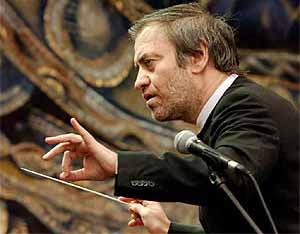25.08.2008
August 23, 2008 (the date of publication in Russian)
Alexander Rublev
POWER OF ART VS EFFORTS OF LIE
Valery Gergiev's concert became the highest evidence of the truth about Tskhinval
 The concert, performed in Tskhinval on May 21 by the St. Petersburg Mariinsky Theater under the baton of Valery Gergiev, before thousands of the surviving residents of the destroyed city and the ruins of South Ossetian Parliament, summarized the very essence of the military conflict in Transcaucasia.
The concert, performed in Tskhinval on May 21 by the St. Petersburg Mariinsky Theater under the baton of Valery Gergiev, before thousands of the surviving residents of the destroyed city and the ruins of South Ossetian Parliament, summarized the very essence of the military conflict in Transcaucasia.
The artistic event implied a lot of historical parallels. The most obvious allusion referred to the besieged Leningrad, where Dmitry Shostakovich composed and originally performed his 7th Symphony. It was performed by the orchestra along with extracts from the 5th and 6th Symphonies of Pyotr Tchaikovsky. Tragic philosophical music was rising above the debris, annunciating the superiority of culture over barbarian instincts, and humanism and justice – over cults of xenophobia and ethnic inequality.
In the starving Leningrad, Shostakovich's concert was visited by everybody who was able to walk. Hungry, sick, and injured citizens required inspiration by art more than food. In Tskhinval, similarly, some people were brought to the place on handbarrows .The relevance of this parallel is even higher, regarding the fact that the capital of South Ossetia had been almost wholly surrounded by the Georgian troops, being connected with the Big Land by a single road, bypassing the Georgian enclaves, named here, like the track across the frozen Ladoga Lake in Leningrad, "The Road of Life".
The parallel between the Georgian troops and the Nazi invaders, who besieged Leningrad between 1941 and 1944, also implies a direct ideological meaning.
In the West, where the situation is judged upon political correct and mostly English-spoken statements of Georgian politicians, the ethnicist approach of Georgians towards Ossetians is not discussed.
Unpleasantly but obviously, for a significant part of Georgia's ruling class, the pride for achievements of national culture is associated with contempt towards neighbors Ц Abkhazians and Ossetians. These peoples are regarded by Georgian nationalists as "savage people", "cave-dwellers", "half-humans" etc.
The dominating assumption that Ц following the terminology of Alfred von Rosenberg Ц the Georgians are a "culture-producing" and the Ossetians are a "culture-consuming" people, was in fact a predetermination of genocide. The Georgian establishment was thus mentally conditioned for the genocidal action of August 7-8.
The fact that the Georgian version of Nazism still enjoys unofficial support is largely a result of ignorance of the Western audience that had been unaware Ц and reluctant to learn anything Ц about the minor peoples of Transcaucasia and their historical background. The word "Ossetians" has been almost blacked out in TV reports and newspaper articles, covering events in Georgia. It was conveniently replaced with the impersonal term of "separatists", deliberately neglecting the identity of this people.
Valery Gergiev belongs to the world's top ten musical directors. His name is known to anyone interested in classical music. At the same time, almost nobody of Americans and Europeans has identified him as an Ossetian. After the great conductor addressed the citizens of Tskhinval in his mother language, this fact will be known. Gergiev is too famous to be ignored, and the West will now at least realize that Ossetians exist; that this people is not a savage tribe but a high developed culture; that the centuries of protection from Russia has given an impetus for development of its spiritual and cultural potential; that the sordid habitation of "Georgia for Georgians", designed by the pro-Western nationalists Zviyad Gamsakhurdia and Mikhail Saakashvili, left no space for the Ossetian genius.
Gergiev's concert has become a requiem for those who perished in Tskhinval on the night of August 7-8. Addressing foreign journalists, Gergiev told them how many people were killed and lost their homes. A man of art, not a military man or politician, he has convincingly conveyed the horrible statistics to the Western community.
"Some of my close friends have lost five persons from one family". This personal evidence of the man, symbolizing musical culture, breaks the silence of global media that have downplayed the scale of the tragedy, and expose the cynicism of those who ignored and denounced the reports about the death toll of the Georgian military operation dubbed, deliberately, "Tsveli Minda" Ц "Clean Field".
Gergiev's concert is likely to exert a strong influence also on Georgian intellectuals. Their ability to reassess the myth of cultural superiority of Georgians over neighbor nations significantly determines the fate of Georgia itself. It has to be understood that in order to build a civilized nation, the Georgian political and cultural establishment has to give up its xenophobic doctrines and superstitions. Otherwise, its future history will be written by adventurers that pave their way to power by means of coups d'etats manipulated by ruthless corporate interests.
Number of shows: 1895
 ENG
ENG 

 ENG
ENG 
